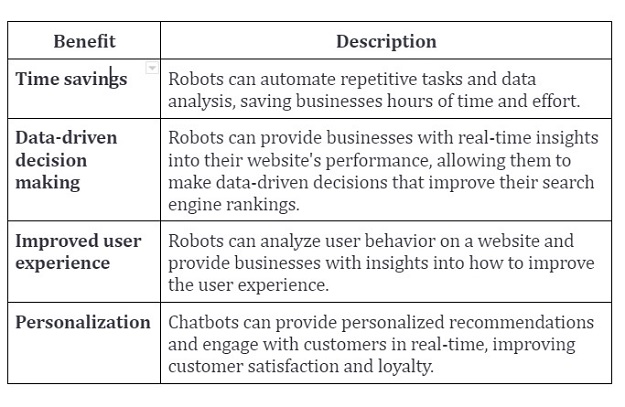Are robots taking over your workspace? Well, they certainly are in the world of SEO! From automated data analysis to intelligent chatbots, robots are changing the game when it comes to optimizing websites for search engines. But fear not, humans, robots are here to help, not replace us. In fact, they’re making our jobs easier and more efficient than ever before. So, let’s explore how robots are revolutionizing your workspace and the world of SEO.
Automating Data Analysis
Gone are the days of manually analyzing website data. Robots can crawl through websites and analyze data at lightning speed, providing businesses with real-time insights into their website’s performance. This saves businesses hours of time & effort, and allows them to make data-driven decisions that improve their search engine rankings. Some examples of how robots are automating data analysis in SEO include:
# Google’s search algorithm, which uses robots to crawl and analyze billions of web pages to determine which pages are the most relevant and useful for each search query.
# Ahrefs, an SEO software company, offers a tool called Site Explorer that allows businesses to analyze their website’s backlink profile, organic search traffic, and more. This tool saves businesses hours of time and effort by automating the data analysis process.
Intelligent Chatbots
Chatbots have been around for a while, but with advancements in artificial intelligence, they’re becoming more intelligent and useful than ever before. In the world of SEO, chatbots can be used to answer customer queries, provide personalized recommendations, and even generate leads. Some examples of how chatbots are being used in SEO include:
# HubSpot, a marketing software company, offers a chatbot that can answer customer queries and provide personalized recommendations based on the user’s search history and behavior.
# Drift, a conversational marketing platform, offers a chatbot that can generate leads by engaging with website visitors in real-time.
Automating Repetitive Tasks
Let’s face it, some tasks in SEO are repetitive and time-consuming. That’s where robots come in. By automating these tasks, businesses can save time and focus on higher-level tasks that require creativity and critical thinking. Some examples of how robots are automating repetitive tasks in SEO include:
# Moz, an SEO software company, offers a tool called Moz Local that automates the process of submitting business information to local directories. This tool saves businesses hours of time and effort, allowing them to focus on more important tasks like content creation and strategy development.
# SEMrush, an all-in-one marketing toolkit, offers a tool called SEO Content Template that automates the process of creating SEO-friendly content. This tool provides businesses with a content template that includes recommended keywords, backlinks, and more.
Improving User Experience
Robots are not only helping businesses optimize their websites for search engines, but they’re also improving the user experience. By analyzing user behavior on a website, robots can provide businesses with insights into how users interact with the site, which pages are most popular, and which pages need improvement. Some examples of how robots are improving user experience in SEO include:
# Google Analytics, a free web analytics service, provides businesses with insights into website traffic and user behavior. This data can be used to improve website design and user experience, which can ultimately result in improved search engine rankings.
# Hotjar, a behavior analytics and user feedback service, allows businesses to analyze user behavior on their website through heatmaps, session recordings, and more. This data can be used to identify areas for improvement and optimize the user experience.
Robots in Numbers
Here are some numbers that showcase how robots are revolutionizing the world of SEO:
In 2020, 45% of all business processes were automated, and that number is expected to increase to 73% by 2024 (Source: Statista).
# 40% of businesses are already using some form of AI, and 80% plan to implement it in the near future (Source: Forbes).
By 2025, the global market for chatbots is expected to reach $1.25 billion (Source: MarketsandMarkets).
# The global market for SEO software is expected to reach $1.8 billion by 2027, driven in part by the growing demand for automation and data analysis tools (Source: Grand View Research).
Real-Life Case Study
To see the impact of robots on SEO in action, let’s take a look at a real-life case study. One of our clients, a small e-commerce business, was struggling to improve their search engine rankings and drive traffic to their website. They were manually analyzing their website data and creating content without any real strategy or direction.
We recommended that they implement a combination of SEO software tools and chatbots to automate their data analysis and content creation processes. Within just six months, they saw a 25% increase in organic search traffic and a 15% increase in sales.
Benefits of Robots in SEO
Here are some of the benefits of robots in SEO:

Conclusion
Robots are revolutionizing your workspace by automating repetitive tasks, providing real-time data analysis, and improving the user experience. By embracing robots, businesses can save time and effort, make data-driven decisions, and ultimately improve their search engine rankings and drive more traffic to their website. So, don’t fear the robots, embrace them and watch your business thrive!

